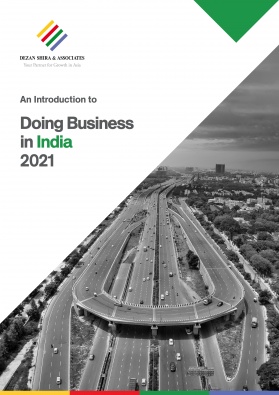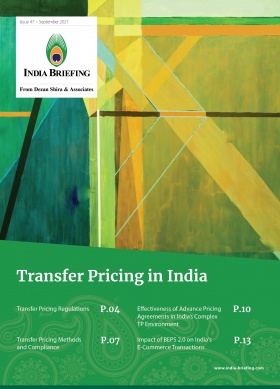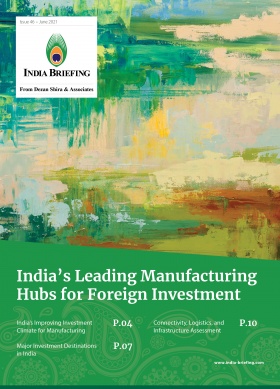What is the Relevance of the Special Valuation Branch to Importers in India?
Importers must adhere to the Special Valuation Branch compliance requirements in India. The SVB investigates whether the valuation of transactions between ‘related persons’, such as intercompany transactions, that facilitate imports into India are valued appropriately and not to reduce Customs Duty liability.
The Indian Government’s favorable policy regime and robust business environment has ensured that foreign capital keeps flowing into the country.
The Government has taken many initiatives in recent years, including relaxing FDI norms across multiple sectors, such as defense, PSU oil refineries, telecom, power exchanges, and stock exchanges, among others.
The consequent increase in the foreign direct investment received by India has in turn led to increased cross-border transactions between the related parties, thereby requiring certain compliances to be adhered to by the multinational companies.
Special Valuation Branch: What is it and when do we approach them?
The Special Valuation Branch (SVB) is a special unit within the Indian Customs department, which specializes in investigating the valuation of transactions between ‘related persons’, as defined under Rule 2 (2) of Customs Valuation (Determination of Value of Imported Goods) Rules, 2007 (hereinafter referred to as “Customs Valuation Rules, 2007”).
Specific customs officials are posted to this department of customs who carry out the investigation and evaluate whether the intercompany prices of goods are influenced due to the relationship between the parties, such as with the intention to reduce their Customs Duty liability, or not.
The SVB’s function is to examine the impact of such intercompany relationship on the invoice value of the imported goods to ensure that the invoicing is at the ‘arm’s length price’ or identify if they have been ‘undervalued’ for the purpose of reducing Customs Duty liability. The said process is exactly opposite to the transfer pricing (TP) analysis under the income tax regulations, which try to examine whether the goods supplied between related entities have been ‘overvalued’ to reduce income tax liability in India.
In case the buyer and seller of the goods are related, the value is to be determined as per the Customs Valuation Rules, 2007.
Who is a ‘related party’?
The term ‘related’ has been defined in Rule 2 (2) of the Customs Valuation Rules, 2007 to establish that the buyer and seller shall be deemed to be related if:
- They are officers or directors of one another’s businesses;
- They are legally recognized partners in business;
- They are employer and employee;
- Any person directly or indirectly owns, controls or holds five percent or more of the outstanding voting stock or shares of both of them;
- One of them directly or indirectly controls the other;
- Both of them are directly or indirectly controlled by a third person;
- Together they directly or indirectly control a third person; or
- They are members of the same family.
Therefore, typically all transactions involving import of goods by an Indian company and its holding company or any associated/affiliated group company located outside India are considered to be transactions between related parties, and which are thus investigated by the Customs authorities.
As per the prescribed procedures, the following cases are not required to be taken up for inquiries by SVBs:
- Import of samples and prototypes from related sellers.
- Imports from related sellers where duty chargeable is unconditionally fully exempted or nil.
- Any transaction where the value of imported goods is less than INR 100,000 (approximately US$1344) but cumulatively these transactions do not exceed INR 2.5 million (approximately US$33,588) in any financial year.
Importers who are related to the supplier in terms of Rule 2(2) of the Customs Valuation (Determination of Value of Imported Goods) Rules, 2007, Rule 2(1) of the Customs Valuation (Determination of Value of Export Goods) Rules, 2007, and those cases which fall under the purview of Section 14(1) of the Customs Act, 1962, are required to register with the SVB.
Presently, the Customs Department has SVBs functioning at five customs authorities in the following port cities – Bengaluru, Chennai, Delhi, Kolkata, and Mumbai. As per the guidelines, the importer is free to select any Customs House for undergoing the SVB investigation based on its convenience. However, it is suggested to select the SVB department that is situated closest to the registered office of the related importer in India.
The Special Valuation Branch of that Customs House, which is located proximate to the Head or Corporate Office of the importer (having special relationships etc. with the suppliers), handles the investigation into valuation of such importer.
Wherever in the declaration prescribed under the Customs Valuation (Determination of Value of Imported Goods), Rules, 2007, the importer has himself made an averment (stated as fact) that the transactions are between related persons in accordance with Rule 2(2) of the Customs Valuation Rules, 2007, and there is a, prima facie, justification for further enquiry, the concerned case of the import is referred to the SVB of the concerned Customs House, where a separate case file is opened and a registration number is assigned to the case.
What are the preliminary documents required for submission of SVB application Annexure A and the procedure for filing?
- a) Collaboration agreement, joint venture agreement, and other agreements with the supplier of the imported goods or with any other person acting for the supplier.
- b) Approval of Government of India/RBI to the agreement, if any.
- c) Statements for last three years duly certified by the Chartered Accountant, containing the following information:
- CIF value and landed cost of imports from suppliers of the imported goods, the collaborator, or associated companies;
- CIF value and landed cost of import from other suppliers;
- Value of standard bought out components procured in India;
- Ex-factory value of the goods; and
- Royalty, net and gross paid or payable.
d) Representative sample invoices of own imports for the last three years and photocopies of the relevant Bills of Entry.
e) Annual reports of importing company for the last three years.
f) Statement regarding equity participation in/of foreign company for the last three years.
g) Statement regarding shareholding of/in any Indian company along with particulars of common Directors.
h) Current price list of product imported from the supplier of the goods, including spares and warranty parts imported by any other person.
i) Representative specimen invoices of procurement of goods procured from some other person by the supplier and supplied importer.
j) Representative specimen invoices of procurement of identical, similar, or connected goods made by companies associated with importer.
k) Representative specimen invoices of imports of identical of similar goods by any other person.
l) Representative specimen of invoices and bills of entry of imports of identical, similar items as spares and warranty parts by the importer or any other person.
m) Details of remittances along with method and mode and deferred payments details, if any.
n) Details regarding any other payment made to or on behalf or under the instructions of the supplier.
o) In order to facilitate the provisional assessment, the importer is required to execute a continuity bond for provisional assessment with the customs authorities at the port of import. The condition of the said bond is that the importer shall within 90 days from the date of importation of the consignment or within such extended period as may be decided by the proper officer produce such documents as may be required and if the importer pays to the President the difference between the duty finally assessed and the duty provisionally assessed in respect to the goods imported from time to time then the bond shall be void and have no effect. All subsequent imports are provisionally assessed till the final Investigation Report is issued by the SVB.
p) The importer is also required to provide a solvency certificate from the bank.
The SVB is mandated to complete an investigation and issue its investigation report to the commissioner within stipulated timelines. The SVB does not have statutory powers to issue an order to the importer. After receiving the SVB report, the commissioner, having followed the principles of natural justice, will pass an order specifying the extent of influence on the declared transaction value.
The obvious question that arises to one’s mind is that what will happen if the Investigation Report issued by SVB authorities accepts or rejects the submissions of the importer and thereby holds that the transaction value has not been or has been influenced by the relationship?
- Once the transaction value declared by the importer is accepted by the SVB, the basis for accepting the transaction value is incorporated in the Investigation Report and the same is forwarded to the port of import. Based on the said Investigation Report, the port authorities carry out the final assessment of the provisionally assessed Bills of Entries, which were filed pending the investigation and no separate order is passed. Going forward, the value of all goods subsequently imported by the importer from its associated companies are also accepted by the authorities till the time they do not find any contemporaneous imports to other unrelated parties in India at higher prices.
- Once an Investigation Report disregarding the transaction value declared by the importer is issued to the port of import, the proper officer at the port of import will issue a show cause notice to the importer within 15 days from the date of receipt of such IR with an intimation of the same to the SVB authorities. In case goods are imported from multiple ports, after issue of notices by the proper officers in the said locations, a common adjudicating authority would be appointed by the Board for the purpose of passing order for finalization of the provisional assessments at all ports.
In such case, the importer is required to file a detailed written submission against the allegations and justify the basis on which the transaction value should be accepted. The Customs port authorities have the right to take the final decision in this regard, which practically, is highly influenced by the suggestions of the SVB authorities. In case the Customs port authorities also reject the transaction value between related parties, an appellate mechanism is provided under the Customs Act where the importer can file an appeal and pursue the litigation further.
Is the Investigation Report issued by SVB valid at all ports in India?
Circular No. 5/2016-Customs does not restrict the importer to import from multiple ports during the pendency or after finalization of the SVB proceedings.
However, practically, in case goods are imported at multiple ports before finalization of the SVB matter, the importer will be required to file Annexure A at all such ports along with a continuity bond and assess the bills of entries provisionally by referring the ongoing SVB investigation at the selected customs house.
Further, suitable reference is also required to be made in its submissions before the SVB authorities of such imports through other ports.
After finalization of the SVB proceedings, the Investigation Report issued by any one SVB is valid at all ports across India.
What is the validity of the Investigation Report? Is there any sunset clause?
There is no sunset clause attached or validity limit for the Investigation Report issued by the Customs authorities.
The valuation methodology, once accepted, shall stay in force until the importer intimates the customs authorities regarding any change in the circumstance surrounding the sale of goods (such as change in valuation methodology, additional payments by importer to supplier, execution of new intercompany agreements between the importer and its related parties outside India etc.).
On filing the declaration, the Customs port authorities shall re-investigate the case based on the new facts and may refer the matter back to the SVB for reconsideration
Due to this, it is extremely important for the importer of goods to keep a track of such changes (for example, a new intercompany agreement) and declare the same to the SVB authorities as the re-assessment is based on self-declaration by the importer. Non-intimation/delay in intimation of such changes to Customs authorities may attract penal consequences.
India’s Customs and TP departments are increasingly synchronizing their efforts to ensure that the same assessee (that is, importer) does not adopt contradictory positions on customs valuation and transfer pricing.
For instance, incurring brand-related advertising, marketing and promotion (AMP) expenses has been recognized as an “international transaction”, which is subject to transfer pricing for which the compensation can be in the form of an AMP contribution, reimbursement, or by way of price adjustment. Where the compensation is to be by way of price adjustment on imported goods, Customs authorities are increasingly scrutinizing transactions to ensure that appropriate customs duty has been paid on the imported goods and, for this purpose, increasingly scrutinizing transfer pricing-related filings made by the same assessee.
The current operational methods of the SVBs are not favorable to importers and hamper the growth of an environment conducive for business. They act as in-country barriers to trade related activities undertaken by group companies. An over-inquisitive approach tends to adversely impact completely genuine import transactions. Hopefully, the SVBs take speedy measures which would facilitate trade and thereby act as a further step towards transforming the government’s “Make in India” vision into a reality.
About Us
India Briefing is produced by Dezan Shira & Associates. The firm assists foreign investors throughout Asia from offices across the world, including in Delhi and Mumbai. Readers may write to india@dezshira.com for more support on doing business in in India.
We also maintain offices or have alliance partners assisting foreign investors in Indonesia, Singapore, Vietnam, Philippines, Malaysia, Thailand, Italy, Germany, and the United States, in addition to practices in Bangladesh and Russia.
- Previous Article India’s Business Environment Reforms Ongoing, Digital Governance Gets More Streamlined
- Next Article Odisha Electric Vehicle Policy, 2021 Targets EV Manufacturing









